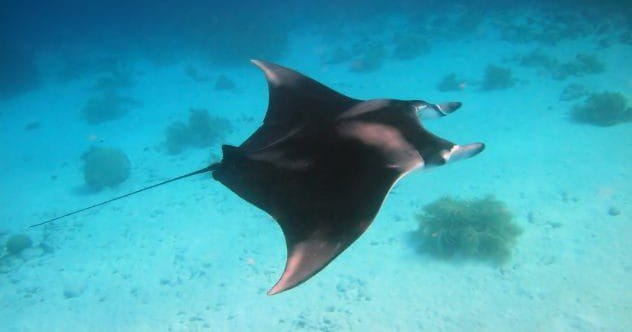The human brain is an amazing organ, packed with billions of neurons. But we’re not the only creatures with brains cleverly adapted for survival. From smart elephants to the bizarre bony-eared assfish, the variety of brains in nature is incredible. Let’s explore some of the strangest!
1. Octopus
Octopuses have a unique challenge: controlling eight arms. Their nervous system allows each arm to act almost independently. Unlike humans, octopuses don’t have a centralized nervous system; instead, over 60% of their neurons are in their arms. Each limb contains around 40 million neurons, acting like a mini-brain, enabling each tentacle to process sensory information and move on its own.
Effectively, octopuses have nine brains! The central brain makes decisions for survival, while leaving other decisions to individual arms. Severed octopus arms can even continue processing data, showing how autonomous these mini-brains are.
2. Spiders
Spinning complex webs requires serious brainpower. Many spiders have enormous brains compared to their bodies. Smaller species have proportionally larger brains, with some tiny spiders dedicating up to 80% of their body to their central nervous systems.
Some arachnids are so brainy that their brains bulge into their legs, filling up to a quarter of their limbs. Baby spiders of these species even have distended bodies to make room for their large brains.
3. Cockroaches
Cockroaches are known for their resilience, even being able to survive decapitation for a while! Unlike humans, they don’t suffer catastrophic blood loss when their head is removed, thanks to their low-pressure circulatory system. Additionally, nerve tissue clumps in each body section allow basic functions like movement to continue, and they can breathe through spiracles throughout their body.
Even the heads can survive if refrigerated with nutrients. Experiments on decapitated roaches help us understand neuron function and suggest that roach brains could contain new antibiotics.
4. Sea Squirts
Sea squirts are distantly related to humans. They start life with two primitive brains, a spinal cord, and neurons for movement. However, once they attach to a stationary object, they reabsorb one brain and their nerve cords because they no longer need them for movement.
The way sea squirts degenerate their nervous system has implications for human health research. Genes causing neurodegeneration in sea squirts are similar to those causing Alzheimer’s disease, making them useful for studying brain disorders.
5. Giant Squid
Giant squids have a beak at the front of their heads, meaning food must pass through their head to reach the digestive system, creating weird brain anatomy. They have a donut-shaped brain to accommodate the esophagus, so everything they eat passes through the middle of their brain.
To protect their brain, giant squids have equipment to break down meals. They use their beak to rip food and a radula, a tongue-like structure covered in tiny teeth, to grind food into small particles.
6. Leeches
It’s often said that leeches have 32 brains, but they actually have multiple ganglia—nerve clusters that carry signals. Leeches possess two main “brains” at the head and tail, along with 21 mid-body nerve clusters that act like mini-brains, totaling 23 “brains.”
Interestingly, leeches don’t need all their brains to perform certain functions. Removing the ganglion at the top of a leech’s “head brain” doesn’t stop it from swimming; in fact, they swim better without it.
7. Manta Rays
Manta rays have huge brains and the highest brain-to-body ratio of any cartilaginous fish, resulting in impressive intelligence. A study showed that manta rays recognize themselves in a mirror, which indicates advanced intelligence.
To keep their brains functioning in cold conditions, they have a structure called the retia mirabilia, which acts like a built-in heat exchanger. This structure warms the blood going to the brain, ensuring it stays warm even in deep, cold dives.
8. Woodpeckers
Woodpeckers can smash their heads against trees up to 12,000 times a day without brain damage. It was once thought that a spongy section of their skull acted as a crash helmet, but recent research shows there’s no shock absorption involved.
The size and shape of the woodpecker’s brain prevent dangerous intracranial pressure. They also have minimal space for cerebrospinal fluid, limiting brain slosh. This allows them to peck without risking brain injury.
9. Bony-Eared Assfish
The bony-eared assfish may have the smallest brain-to-body ratio of any vertebrate. While it has a bulbous head, relatively little of it contains actual brain.
However, what it lacks in brain size, it makes up for in hearing. Its skull contains large otoliths, or “ear stones,” for hearing low-frequency sounds. The brain also has adaptations like a large cerebellum to enhance its sense of movement and spatial awareness in the deep ocean.
10. Elephant
Elephants are known for their intelligence, memory, and problem-solving skills. Despite having brains three times larger than human brains and more neurons, their intelligence doesn’t surpass ours.
The distribution of neurons matters. Elephants have most of their neurons in the cerebellum, which controls muscular activity, while humans have more neurons in the cerebral cortex, responsible for higher-level thinking skills.
From spiders with brains in their legs to the unique adaptations of marine life, the animal kingdom is full of neurological surprises. Each brain is perfectly adapted for its creature’s survival.
What’s the most surprising animal brain adaptation you learned about? Leave your comment below!










